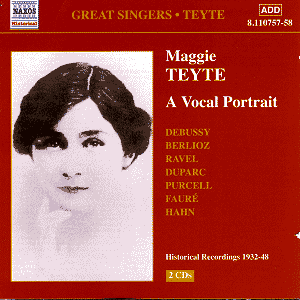
BUY NOW
CD 1
Henry PURCELL (1659-1695)
King Arthur: Fairest Isle, The Libertine: Nymphs and Shepherds (01.08.1941) (1)
Giovanni Battista MARTINI (1706-1784)
Plaisir d’amour (16.01.1942) (1)
André-Ernest-Modeste GRÉTRY (1741-1813)
Le tableau parlant: Vous étiez ce que vous n’êtes plus (21.09.1946) (2)
Giovanni Battista PERGOLESI (1710-1736)
La serva padrona: Aria di Zerbina (in French) (21.09.1942) (2)
Hector BERLIOZ (1803-1869)
Nuits d’été: 2. Le spectre de la rose, 4. Absence (31.07.1940) (3)
Franz Liszt (1811-1886)
Oh! Quand je dors (26.10.1947) (1)
Piotr Ilych TCHAIKOVSKY (1840-1893)
Tears, op. 65/5 (in French) (26.10.1947) (1)
Georges BIZET (1838-1975)
Chanson d’Avril (07.06.1943) (1)
Ernest CHAUSSON (1855-1899)
Le Colibri (07.06.1943) (1)
Jacques OFFENBACH (1819-1880)
La Périchole: Tu n’es pas beau ... Je t’adore brigand (22.09.1932) (4)
André MESSAGER (1853-1829)
Véronique: Petite dinde, ah quel outrage – Ma foi! Pour venir dr Provence (22.09.1932) (4)
Henri DUPARC (1848-1933)
Phidylé, L’invitation au voyage (31.07.1940) (3)
Joseph SZULC (1875-1956)
Clair de lune (22.08.1941) (1)
Henri de FONTENAILLES
Obstination (20.07.1944) (1)
Gabriel FAURÉ (1845-1924)
Après un rêve (26.03.1941), Nell (10.02.1943), Clair de lune (06.01.1942) (1)
Émile PALADILHE (1846-1926)
Psyché (26.03.1941)
Reynaldo HAHN (1874-1947)
L’heure exquise, Offrande (17.04.1941) (1), Si mes vers avaient des ailes (20.09.1932) (5)
CD 2
Claude DEBUSSY (1862-1918)
Fêtes galantes I, Fêtes galantes II, Trois Chansons de Bilitis (12.03.1936) (6), Le Promenoir des duex amants (13.03.1936) (6), Proses lyriques: 2. De grève (13.03.1936) (6), Ariettes oubliées: 5. Green (17.04.1941) (1), Beau soir, Romance (10.02.1944) (1)
Maurice RAVEL (1875-1937)
Histoires naturelles: 4. Le martin-pêcheur, Deux épigrammes: 2. Anne jouant de l’espinette (05.10.1947) (1), Shéhérazade (12-13.07.1948) (7)
Sir Edward ELGAR (1857-1934)
Pleading (23.12.1941) (1)
Roger QUILTER (1877-1953)
Now sleeps the crimson petal (23.12.1941) (1)
Arthur Goring THOMAS (1850-1892)
Night hymn at sea (25.11.1941) (1, 8)
Kennedy RUSSELL (1883-1954)
By Appointment: White roses (10.1934) (4)
Sigmund ROMBERG (1887-1951)
The Student Prince: Deep in my heart dear (22.09.1932) (4)
Dame Maggie Teyte (soprano), Gerald Moore (piano) (1), Orchestra/Jean Paul Morel (2), London Symphony Orchestra/Leslie Heward (3), anonymous orchestra (4), George Reeves (piano) (5), Alfred Cortot (piano) (6), Royal Opera House Orchestra, Covent Garden/Hugo Rignold (7), John McCormack (tenor) (8)
Dates as above, locations not given
CD transfers by Ward Marston
 NAXOS HISTORICAL 8.110757-58 [2 CDs 77:48,
75:39] [ADD]
NAXOS HISTORICAL 8.110757-58 [2 CDs 77:48,
75:39] [ADD]